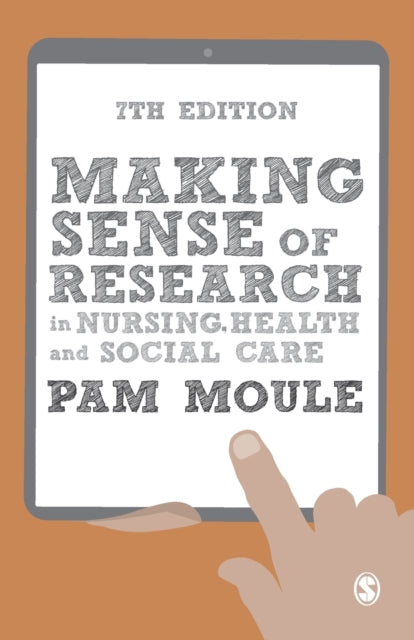Pam Moule
Making Sense of Research in Nursing, Health and Social Care
Making Sense of Research in Nursing, Health and Social Care
YOU SAVE £1.80
- Condition: Brand new
- UK Delivery times: Usually arrives within 2 - 3 working days
- UK Shipping: Fee starts at £2.39. Subject to product weight & dimension
Bulk ordering. Want 15 or more copies? Get a personalised quote and bigger discounts. Learn more about bulk orders.
Couldn't load pickup availability
- More about Making Sense of Research in Nursing, Health and Social Care
Research is a critical component of nursing, health, and social care, and this guide provides an overview of the different research methods and terminology used in these fields. The new edition of the book includes updates in light of the 2018 NMC standards, improved case examples, and activities that help students develop critical appraisal skills and a dissemination plan. It is essential reading for undergraduate and postgraduate students in the health and therapy professions.
Format: Paperback / softback
Length: 232 pages
Publication date: 25 November 2020
Publisher: SAGE Publications Ltd
Research is a systematic and rigorous process of gathering, analyzing, and interpreting data to gain insights and understanding into a particular topic or problem. It is an essential component of education, healthcare, and social sciences, as it helps to inform decision-making, develop new treatments and interventions, and improve the quality of life for individuals and communities.
In the context of nursing, health, and social care, research plays a crucial role in improving patient outcomes, advancing healthcare practices, and promoting social well-being. Nurses, healthcare professionals, and social workers use research to identify evidence-based practices, evaluate the effectiveness of interventions, and develop new strategies to address healthcare challenges.
There are several different types of research methods used in nursing, health, and social care, including quantitative research, qualitative research, mixed methods research, and participatory research. Each method has its own strengths and weaknesses, and the choice of method depends on the research question, study population, and available resources.
Quantitative research involves the collection and analysis of numerical data, such as statistics, surveys, and experiments. It is often used to test hypotheses and measure the effectiveness of interventions. Quantitative research can be conducted using statistical software, such as SPSS or SAS, and can provide a clear and objective understanding of the data.
Qualitative research, on the other hand, involves the collection and analysis of non-numerical data, such as interviews, observations, and focus groups. It is often used to gain a deeper understanding of the experiences and perspectives of individuals and communities. Qualitative research can be conducted using interview guides.
Mixed methods research combines quantitative and qualitative research methods to gain a more comprehensive understanding of a particular topic or problem. It involves the integration of data collection and analysis techniques from both methods, and can be particularly useful when the research question is complex or multifaceted.
Participatory research involves the active involvement of individuals or communities in the research process, from the design of the study to the interpretation of the findings. It is particularly useful in developing interventions that are tailored to the needs and preferences of the target population.
Once the research method has been chosen, the researcher must develop a research question, design a study, collect data, analyze the data, and interpret the findings. This process can be time-consuming and requires a significant investment of resources, including time, money, and human resources.
However, the benefits of research are numerous. Research can help to improve patient outcomes by identifying evidence-based practices and interventions that are effective in reducing morbidity and mortality. It can also help to advance healthcare practices by developing new treatments and interventions that are more effective and cost-effective. Research can also help to promote social well-being by identifying the factors that contribute to social inequality and developing strategies to address these factors.
In conclusion, research is a critical component of nursing, health, and social care. It plays a crucial role in improving patient outcomes, advancing healthcare practices, and promoting social well-being. There are several different types of research methods used in these fields, and the choice of method depends on the research question, study population, and available resources. By undertaking research, nurses, healthcare professionals, and social workers can make a significant impact on the lives of individuals and communities.
Weight: 298g
Dimension: 138 x 215 x 17 (mm)
ISBN-13: 9781529712018
Edition number: 7 Revised edition
This item can be found in:
UK and International shipping information
UK and International shipping information
UK Delivery and returns information:
- Delivery within 2 - 3 days when ordering in the UK.
- Shipping fee for UK customers from £2.39. Fully tracked shipping service available.
- Returns policy: Return within 30 days of receipt for full refund.
International deliveries:
Shulph Ink now ships to Australia, Belgium, Canada, France, Germany, Ireland, Italy, India, Luxembourg Saudi Arabia, Singapore, Spain, Netherlands, New Zealand, United Arab Emirates, United States of America.
- Delivery times: within 5 - 10 days for international orders.
- Shipping fee: charges vary for overseas orders. Only tracked services are available for most international orders. Some countries have untracked shipping options.
- Customs charges: If ordering to addresses outside the United Kingdom, you may or may not incur additional customs and duties fees during local delivery.


